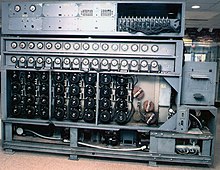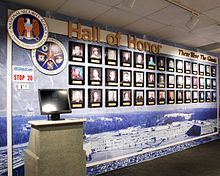Joseph Desch

Joseph Desch (born May 23, 1907 in Dayton , Ohio , † August 3, 1987 in Kettering , Ohio) was an American engineer and cryptologist.
Life
Joe, as he was mostly called, was instrumental in developing the American version of the British Turing bomb during World War II . His high-bombs were in April 1943 at the United States Naval Computing Machine Laboratory (NCML) produced, which is based in the National Cash Register Company (NCR) in Dayton ( Ohio had). They aimed at the highest possible deciphering speed and were used especially against the Enigma-M4 with four rollers used by the German submarines . According to the NSA (National Security Agency) 121 machines were in operation, each of which required about 20 minutes of running time.
In 1948 he received the Medal for Merit , at that time the highest civilian honor in the USA, and in 2011 was posthumously inducted into the Hall of Honor (German: Ehrenhalle) of the National Security Agency NSA.
literature
- Jim DeBrosse and Colin Burke: The Secret in Building 26 - The Untold Story of How America Broke the Final U-boat Enigma Code. Random House , 2005. ISBN 978-0-37575-995-6 .
- John AN Lee, Colin Burke, Deborah Anderson: The US Bombes, NCR, Joseph Desch, and 600 WAVES - The first Reunion of the US Naval Computing Machine Laboratory . IEEE Annals of the History of Computing, 2000, pp. 27ff. Accessed: May 21, 2008. PDF; 0.5 MB ( Memento from February 21, 2007 in the Internet Archive )
Web links
- Portrait photo , accessed September 4, 2017.
- Dayton Codebreakers Homepage (English)
- CV (English)
- Newspaper report on the Dayton Codebreakers ( Memento from December 18, 2005 in the Internet Archive )
- Joseph Desch in the database of Find a Grave (English)
| personal data | |
|---|---|
| SURNAME | Desch, Joseph |
| BRIEF DESCRIPTION | American cryptologist |
| DATE OF BIRTH | May 23, 1907 |
| PLACE OF BIRTH | Dayton , Ohio , United States |
| DATE OF DEATH | 3rd August 1987 |
| Place of death | Kettering , Ohio |

